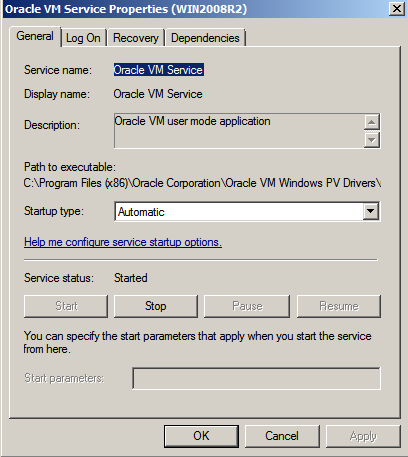To install the Oracle VM Guest Additions, you first download a set of packages from a yum repository to the virtual machine. You can download the packages from the Unbreakable Linux Network (ULN) or the Oracle Linux Yum Server. After you download the required packages, you use the yum install to install them.
The following table lists the packages for the Oracle VM Guest Additions:
Package | Description | Required or Optional |
|---|---|---|
| Library that adds support for the Oracle VM API. | Required |
| Library that adds developer support for the Oracle VM API. | Optional |
| Daemon that handles configuration events and enables sending and receiving of messages between the virtual machine and Oracle VM Manager. | Required |
| JSON encoder and decoder for Python. | Required |
| Library that communicates with the Oracle VM API kernel infrastructure. | Required |
| Basic operating system configuration scripts. | Required |
| Script for configuring virtual machine authentication. | Optional |
| Script for configuring virtual machine datetime settings. | Optional |
| Script for configuring virtual machine firewall. | Optional |
| Script for configuring virtual machine network settings. | Optional |
| Script for configuring virtual machine selinux settings. | Optional |
| Script for configuring virtual machine ssh settings. | Optional |
| Script for configuring virtual machine system settings. | Optional |
| Script for configuring virtual machine user settings. | Optional |
For Microsoft Windows guests, the Oracle VM Guest Additions are included in the Oracle VM Paravirtual Drivers. The implementation of the guest additions consists of these components:
vmapi.dll: a dynamic link library that exposes callable interfacesovmsvc: the service that receives and sends events and messagesxenpci: the driver that interacts with the hypervisorovmcmd: the command used to invoke the guest additions
vmapi.dll
The vmapi.dll exposes interfaces to functions for communication between
Windows applications and the xenpci driver in the Windows guest operating
system. Applications load this library and call the exported functions to access
xenpci. Normally device I/O controls (IOCTLs) are used to communicate
with the xenpci driver. The following table shows function names and their
descriptions:
|
Function |
Description |
|---|---|
|
OVMAPI_Register |
initializes OVMAPI and optionally registers a callback |
|
OVMAPI_ParamGetValue |
retrieves name-value pairs stored within the OVMAPI engine |
|
OVMAPI_ParamSetValue |
creates or modifies a name-value pair |
|
OVMAPI_Subscribe |
receives particular events in the application registered event handler |
|
OVMAPI_UnSubscribe |
blocks particular events in the application registered event handler |
|
OVMAPI_EventComplete |
completes the event with a finalizing status code at a later time |
|
OVMAPI_ParamGetValueSize |
retrieves the size, in bytes, of a parameter value |
|
OVMAPI_GetSessionFileDescriptors |
retrieves the internal file descriptor for use in making special calls to the driver |
|
OVMAPI_UserEventPublish |
sends application-specific events to the management server and to other OVMAPI-enabled applications running on the same VM |
|
OVMAPI_ParamGetAllNames |
browses for existing parameters that may be of interest to the application |
|
OVMAPI_ParamGetCount |
retrieves the number of existing parameters |
|
OVMAPI_UnRegister |
terminates OVMAPI usage |
ovmsvc
The ovmsvc service starts automatically by default when the Windows VM
is booted. The command to install or uninstall this service is ovmsvc
install or ovmsvc uninstall respectively. The
ovmsvc service monitors messages sent from Oracle VM Manager, and sends Windows VM
specific information, such as the operating system version and the VM's IP address. It uses
the vmapi.dll to implement communication between the Windows guest and
Oracle VM Manager. The following figure shows ovmsvc running inside a Windows
VM.

When ovmsvc is started, it opens the xenpci device
and registers a callback function where messages are processed. A thread is created to monitor
events corresponding with vmapi messages. The current callback function of
ovmsvc processes VM shutdown messages; other messages, for example
"snapshot", could be implemented as additional features.
xenpci
Applications exchanging messages with Oracle VM Manager use the xenpci driver, which implements
several IOCTLs to process messages. The xenpci driver directly accesses xenstore, a memory
area shared by Xen domains. The ovmsvc calls API functions to send or read
VM messages to or from xenstore.
The xenpci driver uses the xenbus_watch function to
monitor incoming messages. The xenpci driver initialization registers a watch function on the
xenstore key "control/oracle-vmapi/to-guest/last-write". Messages sent by
Oracle VM Manager are set in this xenstore key. The watch function of xenpci is
triggered when this xenstore key changes. The watch function checks and sends out events, a
monitor thread acknowledges events, and a callback function processes API messages.
The ovmsvc sends Windows VM messages during its startup process, and
uses an IOCTL in xenpci to write the xenstore key
"control/oracle-vmapi/from-guest/%d/%s". The ovmsvc
updates the message periodically to synchronize the information, such as guest IP address,
from the guest to Oracle VM Manager.

